
Executive Board visits African Studies Centre: ‘We work from African perspectives’
From the energy transition in Namibia to sustainable jobs for young Nigerians, from African cookbooks to vodcasts on vintage Swahili booklets: during a recent visit by the Executive Board, staff from the African Studies Centre Leiden and the African Library presented their research, teaching and acquisition activities.
On the wall of the room where the Executive Board was welcomed hangs a map of Africa. Apart from a few countries in the north, the entire continent is coloured red. ‘What does the red mean?’ asked Rector Magnificus Hester Bijl. ‘These are countries where our institute has conducted research or actively collaborated in the past ten years’, explained Scientific Director Marleen Dekker.
It’s an impressive number of projects for an institute with around 40 staff, around 20 of whom are academic staff. As a multidisciplinary institute, the African Studies Centre Leiden (ASCL) is the only one of its kind in the Netherlands focused on the study of Africa and the continent’s evolving role in the world order. ‘Not from a Dutch or European perspective, but from African perspectives’, Dekker emphasised. The ASCL goes beyond ‘traditional’ African Studies topics such as linguistics, history and culture, and also explores areas like demographics, economics, business, geography and law. ‘We collaborate with other faculties and institutes in Leiden across multiple disciplines’, said Dekker. ‘This interfaculty and interdisciplinary approach makes the Centre unique and an important place for sparking discussions.’
-
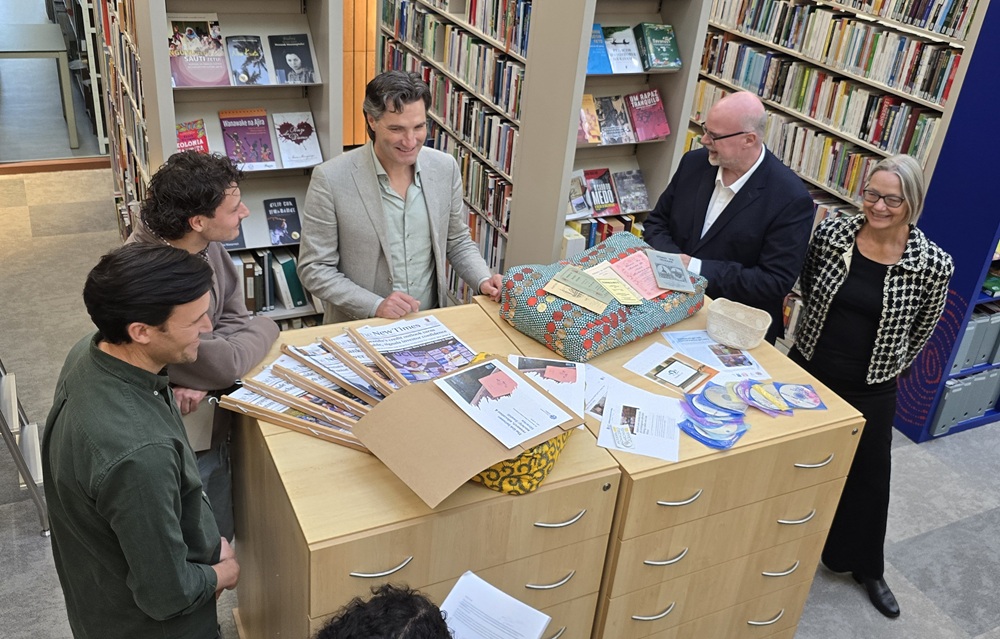
The Board speaks with library staff members Pepler Head and Joris Martens -
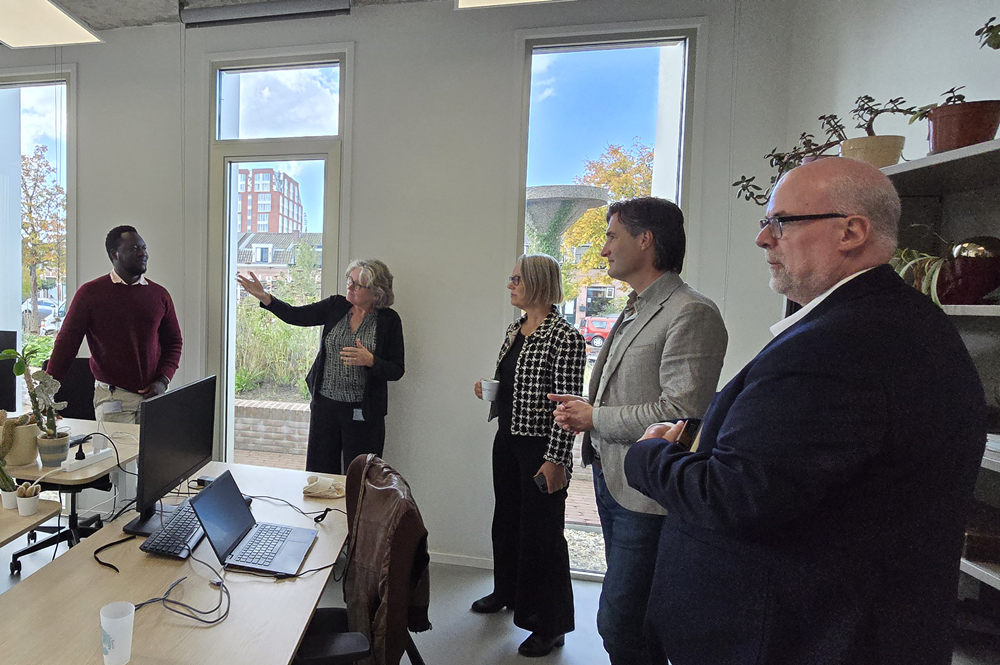
PhD candidate Robert Okello is studying the evolution of traditional legal systems in Northern Uganda -
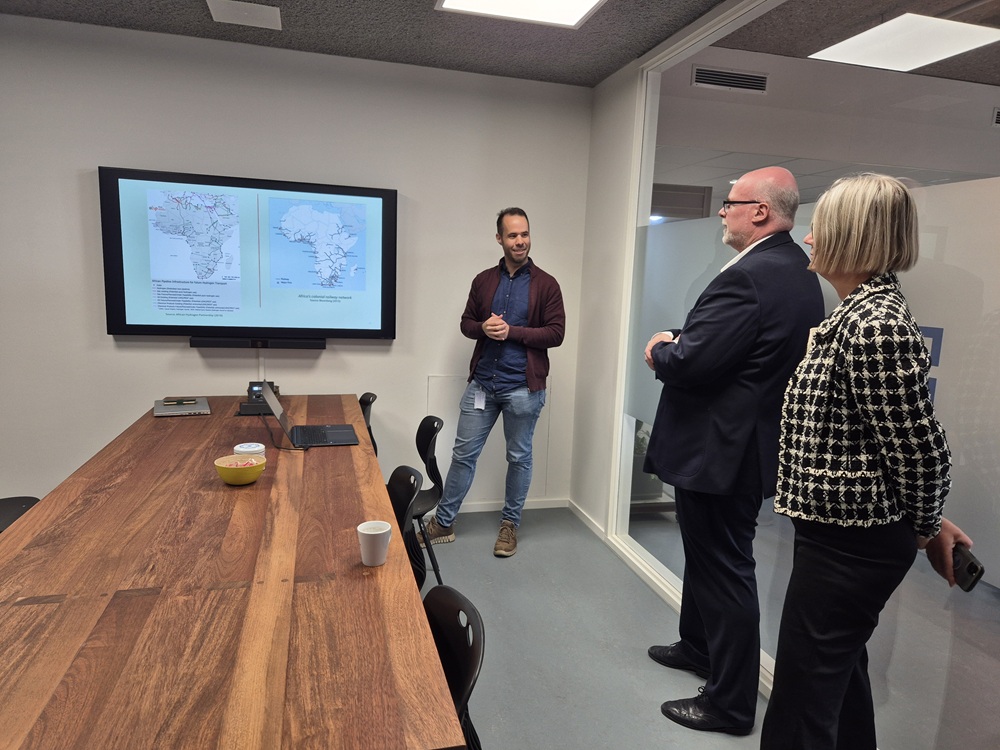
Postdoc Eric Cezne focuses on the political geography of the energy transition, with a particular interest in green hydrogen production in Africa -
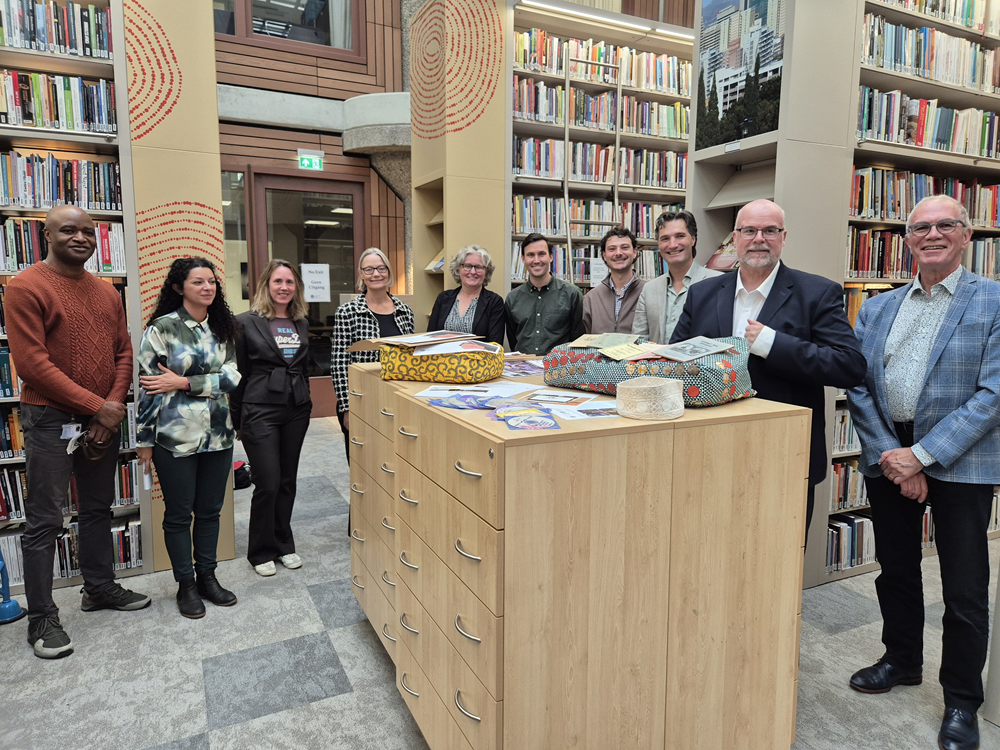
-
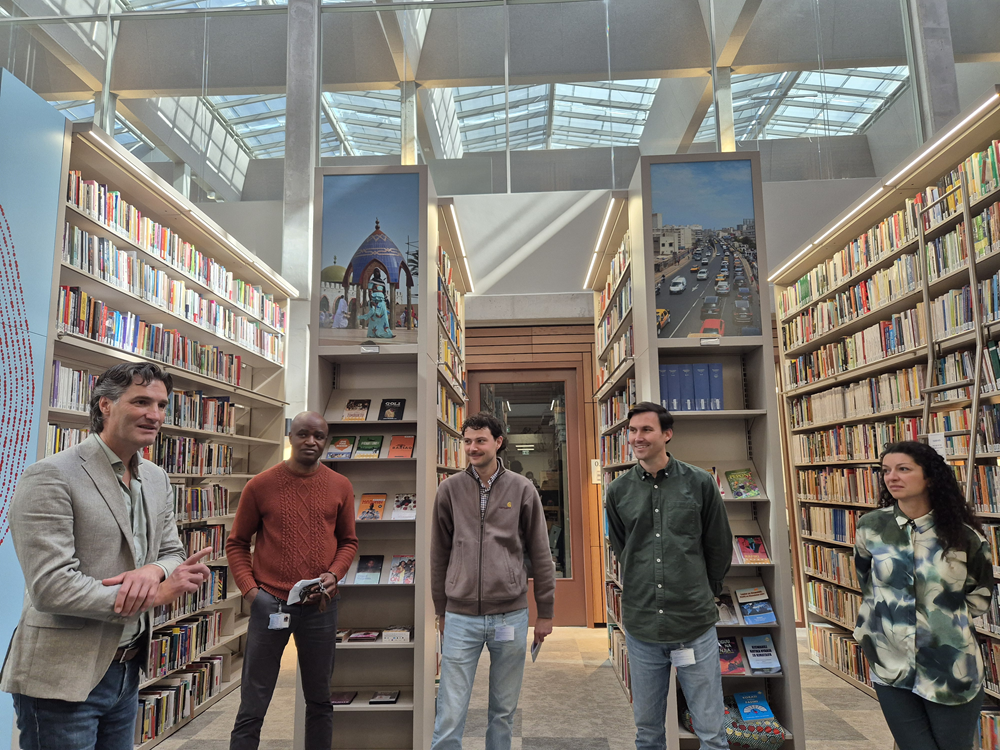
Acting chair Timo Kos, Head of Research Akinyinka Akinyoade, library staff members Joris Martens and Pepler Head and university lecturer Annachiara Raia
Green curriculum in Nigeria
This collaboration and interdisciplinarity are a central theme throughout the visit, as shown in the presentations by young researchers. PhD candidate Robert Okello is studying the evolution of traditional legal systems in Northern Uganda. He is jointly appointed by the ASCL and the Van Vollenhoven Institute for Law, Governance and Society. Postdoc Eric Cezne focuses on the political geography of the energy transition, with a particular interest in green hydrogen production in Africa, a resource in high global demand. Through the Leiden-Delft-Erasmus alliance, his team is organising a dialogue with local communities in Namibia, scheduled for next year. Representing the ASCL-affiliated INCLUDE knowledge platform, researcher Anika Altaf and Knowledge Manager Victoria Manya presented a project aimed at creating sustainability jobs for young Nigerians. Within just a few months, the platform successfully launched a new training curriculum on green energy in Nigeria.
'The Centre is an important place for sparking discussions'
Unique collection
The presentations were followed by a guided tour of the African Library, which began as a documentation centre in 1947 and has become the leading expertise centre on Africa in the Netherlands, and a respected institute in Europe. The collection covers Africa in the broadest sense, with a focus on the social sciences and humanities – from art and photography to Swahili language books and the ASCL’s own publications. Fun fact: African cookbooks are becoming increasingly popular among students.
Acting President Timo Kos was curious about how the university’s African Library compares to other European collections. ‘Our archives are unique’, said Head of Department Liesbeth Kanis. ‘Unlike many libraries in Europe, we actively travel to Africa to acquire materials. We believe it’s essential that African voices are represented here.’
Vodcast in Swahili
Those African voices are quite literally heard in Assistant Professor Annachiara Raia’s Veni-funded research on Swahili literary networks. She created a vodcast series on religious booklets produced in East Africa from the 1930s onwards. Viewers can listen to the texts being read aloud in Swahili while browsing through these vintage booklets onscreen. ‘I think it’s important to show students that studying literature and history isn’t just about beautifully bound books – it’s also about bringing texts to life’, Raia explained.

Opportunities and challenges
Rector Magnificus Hester Bijl was impressed by the many interdisciplinary examples shared during the visit. ‘It’s really inspiring to see how you collaborate with all these researchers both within and beyond our university.’
After the tour, the Board met with the ASCL’s management team to discuss future opportunities and challenges. Like the rest of the university, the ASCL is facing budget cuts. As it will not be able to fully replace senior researchers when they retire, the focus in the coming years will be on attracting young researchers who bring their own external funding, explained Head of Research Akinyinka Akinyoade. ‘It won’t completely close the gap, but it’s the direction we’re heading.’
‘What can we as the Board do to help secure external funding?’ asked Kos. Liesbeth Kanis suggested exploring more opportunities at the European level, through initiatives such as the university’s Una Europa programme, for example. Bijl agreed that bringing Leiden experts to Brussels for meetings might raise their visibility. Vice-Rector and former FGGA Dean Erwin Muller asked about growth opportunities in teaching, including in areas like security studies. ‘Not just for undergraduate students but also in terms of lifelong learning.’ This presents promising opportunities for the future, Dekker agreed. The ASCL has already been offering masterclasses to the Ministry of Foreign Affairs for some time, and is currently working with Leiden Law School in this area.
Visiting the institutes
Research at Leiden University is organised in 33 institutes. The Executive Board is visiting all the faculty institutes to find out what is going on there in these times of cutbacks, and to learn about developments in research and education.
Photos: Jessie van Moorsel and Evelien Flink
